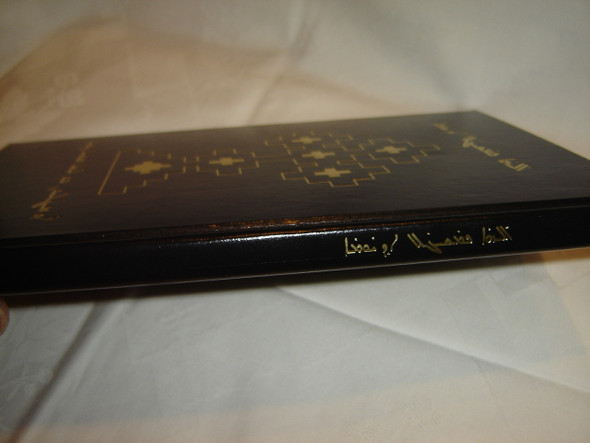Description
Evangelienbauf: The Four Gospels in Plattdeutsch (Low German)
Product Details:
- Title: Evangelienbauf / The Four Gospels in Plattdeutsch (Low German) language / Die 4 Evangelien in Plattdeutsch / Dat is dat Evangelium von Matthäus, Markus, Lucas un Johannes
- Language: Plattdeutsch (Low German)
- Pages: 200
- Publisher: British and Foreign Bible Society / Britische und Ausländische Bibelgesellschaft
- Publication Year: 1928
- Condition: Used, like new
Overview:
"Evangelienbauf" presents the four gospels—Matthew, Mark, Luke, and John—in Plattdeutsch, the Low German dialect. This antique edition, printed in Germany before World War II, offers readers a unique glimpse into the biblical texts through the lens of regional language and culture. The book includes the complete texts of the gospels, providing an opportunity for those who speak or wish to learn Plattdeutsch to engage deeply with the Christian scriptures.
Interesting Facts:
- Cultural Significance: Plattdeutsch is spoken in various regions of northern Germany and is an integral part of the cultural heritage in these areas.
- Historical Context: This 1928 edition reflects the linguistic traditions of its time, preserving the dialect's richness in a religious context.
- Target Audience: Ideal for collectors of antique religious texts, scholars of language, and individuals interested in regional dialects.
Publishers:
- British and Foreign Bible Society
- Britische und Ausländische Bibelgesellschaft
Hashtags:
#Plattdeutsch #LowGerman #Gospels #AntiqueBooks #BibleSociety #ChristianLiterature #CulturalHeritage
Printed in Berlin, Germany in 1928
Plautdietsch speakers today are mostly the descendants of Mennonites who fled from what is today the Netherlands and Belgium in the 16th century to escape persecution and resettled in the Vistula delta. They took with them their Dutch, West Frisian and Dutch Low Saxon dialects, which over time they mixed with East Low German dialects, the so-called Weichselplatt, of the region. As Mennonites they kept their own (primarily Dutch and Low-German) identity, using Standard Dutch well into the 18th century. At the time of their migration to the Russian Empire, their spoken language resembled the dialects of the region with only some few Dutch elements. Their East Low German dialect is still classified as Low Prussian, or simply Prussian. Russian Mennonites trace their genealogical roots mostly to the Low Countries and north Germany, and to a lesser degree to southern Germany and Switzerland.
Beginning in the late 18th century, the expanding Russian Empire invited Germans and many from the Kingdom of Prussia, including many Mennonites, to create new colonies north of the Black Sea in an area that Russia had recently acquired in one of the Russo-Turkish Wars. This is now part of Ukraine as well as other countries. Beginning in 1873, many Plautdietsch-speaking Mennonites migrated from the Russian Empire to the United States and Canada.
In 1922 Plautdietsch-speaking Mennonites from Canada started to settle in Mexico, and in 1927 in Paraguay. In the 1930s Mennonites emigrated mainly from Soviet Ukraine directly to Brazil. The first Mennonite settlement in Bolivia was founded in 1957 by Plautdietsch-speaking Mennonites from Paraguay. Soon, very conservative Plautdietsch-speaking Mennonites from Canada, Mexico, and Belize also relocated to Bolivia, settling together. In 1986/7 a settlement was founded in Argentina by Plautdietsch-speaking Mennonites from other Latin American countries.
Evangelienbauf: Die vier Evangelien in Plattdeutsch (Niederdeutsch)
Produktdetails:
- Titel: Evangelienbauf / Die vier Evangelien in Plattdeutsch (Niederdeutsch) / Die 4 Evangelien in Plattdeutsch / Dat is dat Evangelium von Matthäus, Markus, Lucas un Johannes
- Sprache: Plattdeutsch (Niederdeutsch)
- Seiten: 200
- Verlag: Britische und Ausländische Bibelgesellschaft
- Erscheinungsjahr: 1928
- Zustand: Gebraucht, wie neu
Übersicht
"Evangelienbauf" präsentiert die vier Evangelien – Matthäus, Markus, Lukas und Johannes – in Plattdeutsch, dem Niederdeutschen Dialekt. Diese antike Ausgabe, die vor dem Zweiten Weltkrieg in Deutschland gedruckt wurde, bietet den Lesern einen einzigartigen Einblick in die biblischen Texte durch die Linse der regionalen Sprache und Kultur. Das Buch enthält die vollständigen Texte der Evangelien und bietet denen, die Plattdeutsch sprechen oder lernen möchten, die Möglichkeit, sich intensiv mit den christlichen Schriften auseinanderzusetzen.
Interessante Fakten
- Kulturelle Bedeutung: Plattdeutsch wird in verschiedenen Regionen Norddeutschlands gesprochen und ist ein wesentlicher Bestandteil des kulturellen Erbes in diesen Gebieten.
- Historischer Kontext: Diese Ausgabe von 1928 spiegelt die sprachlichen Traditionen ihrer Zeit wider und bewahrt den Reichtum des Dialekts in einem religiösen Kontext.
- Zielgruppe: Ideal für Sammler antiker religiöser Texte, Sprachwissenschaftler und Personen, die sich für regionale Dialekte interessieren.
Verlage
- Britische und Ausländische Bibelgesellschaft
Hashtags
#Plattdeutsch #Niederdeutsch #Evangelien #AntiquarischeBücher #Bibelgesellschaft #ChristlicheLiteratur #KulturellesErbe
 1.jpg)
 3.jpg)
 7.jpg)
 10.jpg)





































